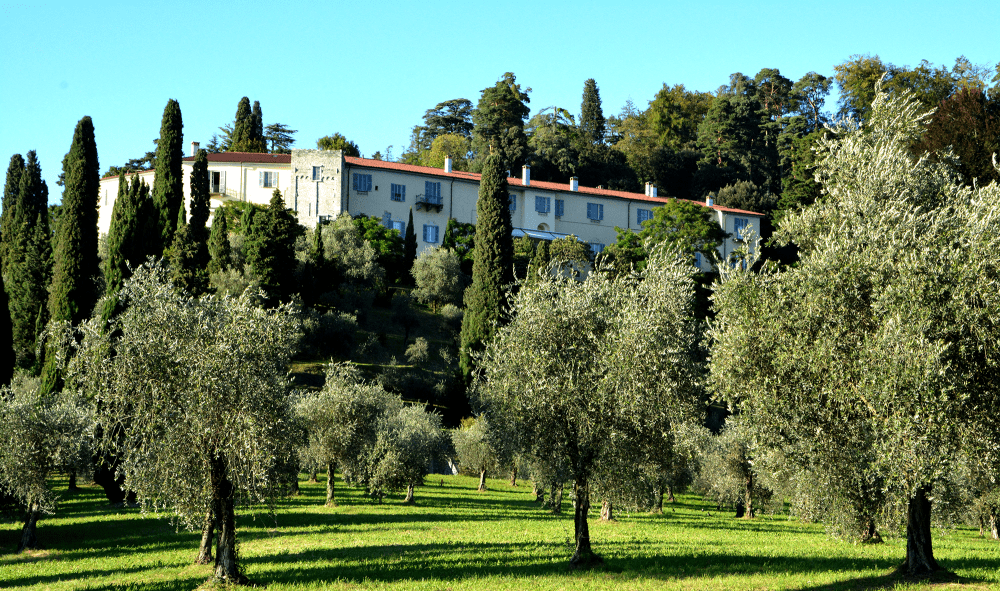Amitava Kumar Uses Fiction to Understand the Truth
In Amitava Kumar’s autofiction novels, the protagonists’ storied journeys mirror his own experiences. The novel he began at Bellagio, “A Time Outside This Time” opens to meet the narrator at a fellowship program in Italy where he, too, is working on a novel inspired by his own life. Amitava used this meta-narrative to explore the boundary between fiction and misinformation. The narrator reflects Amitava’s curiosity. “I use what is called real life to craft my fiction. How is it different from fake news?”
When Amitava arrived at the Bellagio Center in 2018, the threat of misinformation was top of mind. Communities around the world grappled with the consequences as fake news stories ran rampant. Amitava felt the impacts in both the countries he calls home, the United States and India.
“As a person who was not living in his country of origin, I felt I was reporting on two different sets of experiences and addressing two different sorts of audiences. Fake news was in circulation both in the U.S. and in India, and I thought more actively about how this was a global reality,” he said. “So I began to think of a way I could tell a story about fake news.”
He resolved to use his time at the Bellagio Center to understand the sensationalism of fake news and the meaning of truth. “I wanted to address something that would help people understand what is happening to us in this time, and make it clearer,” he said.
Fiction vs. fake news
“A Time Outside This Time” diverges from Amitava’s story when the narrator encounters COVID-19 and several other challenges. “He has to confront not only a pandemic but also an infodemic ― the spread of false information,” Amitava said.
As he unpacked the spread of misinformation and our “post-truth era,” Amitava wanted to understand the novelist’s role. “I began to think very deeply about the place of fiction during a time when there is a fiction called ‘fake news,’” he said.
“I concluded that the task of the novelist is to introduce doubt. At a basic level, it tells people they should question and cross-check the truth. On a more abstract level, it tells the reader to think of the truth as not carrying a burden of totality or absolutism, but instead is contradictory.”
The proportional threat of AI
Amitava says in some cases, humans contribute more to the spread of misinformation than AI. When Amitava researched the novel, he used a study that MIT researchers published in 2018 and found that on Twitter, people spread false news stories faster and deeper than robot accounts, or “bots.”
While he acknowledges that AI is a great threat as a spreader of misinformation, Amitava hopes that equal concern remains on the role of people, too. “How do we engage with the threat of AI but not so much that we take humans out of the equation?”
Moreover, Amitava says he is not distraught over the threat that AI may have to academics and writers like himself. “We worry, are the papers being written by AI? And we should worry more about how we can come up with prompts in our classes that inspire our students to write about their own experiences and engage with their own histories, which AI has no clue about,” he said. “How do we exercise our imagination to access our deepest humanity for our readers and our students?”
He says the same goes for the media. “Only a writer can create the stories that explain an image. AI can mechanically edit an image to perfection, but it cannot endow it with a narrative.”
Bridging connections between people and planet
Lately, Amitava has centered his writing on stories about the impacts of climate change, in hopes it will stir people to connect with and take action against the crisis. In 2023, he published a short story about Joshimath, India, which is also known as “the sinking town” as it slides down from construction of a hydroelectric power dam through the mountain that holds it. “The media doesn’t publish the stories, and people need to hear them,” he said.
Amitava is currently teaching a course on nature writing, and he encourages students to access this deep sense of humanity in relation to the earth and climate change. “I’m exploring in my class how we can use emotions and emotional writing to lead people to stronger and clearer recognition of climate change.”
He says this class is a source of hope. “My students are actively engaged in trying to understand and alter the world. We are trying to find new words for the changing conditions that people will grasp, and not become numb to.”
